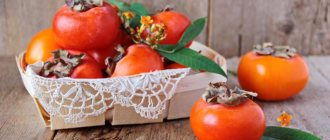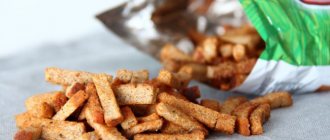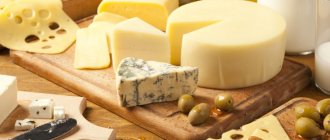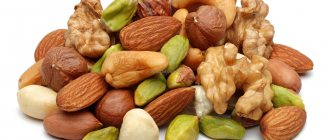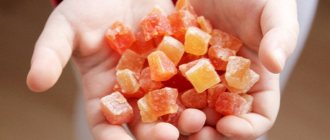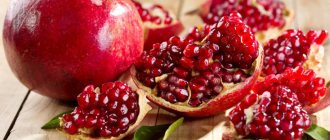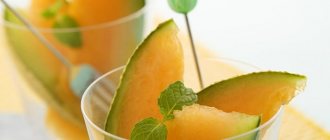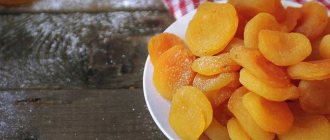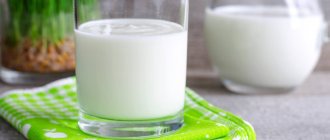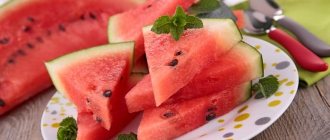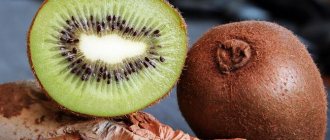Useful properties of mushrooms
The effect on the human body is determined by the biochemical composition.
Mushrooms contain a large amount of proteins with a low calorie content; they quickly fill you up and reduce the feeling of hunger. This allows them to be used in weight loss diets. A variety of amino acid, vitamin and mineral compositions also make the product desirable for consumption. Contains vitamins PP, A, C, E, group B, beta-carotene. Minerals include potassium, phosphorus, magnesium, iodine, and chromium. There is calcium, chlorine, zinc, iron, and fluorine in small quantities.
The beneficial properties of mushrooms include:
- strengthening the immune system, muscles, musculoskeletal system;
- increased visual acuity;
- improvement of the external condition of the skin, teeth, nails;
- normalization of the nervous, cardiovascular, hematopoietic, hormonal systems;
- antitumor, anti-inflammatory effect;
- removal of heavy metals and radioactive substances from the body;
- reducing blood cholesterol levels.
On a note! Chanterelles are useful for the prevention and treatment of tuberculosis.
Authorized and safe
Mushrooms grown in the right conditions in nurseries are considered the safest for a nursing mother. These are “cultivated” products, including oyster mushrooms and champignons.
Champignon
Champignons contain minerals, vitamins, organic acids, carbohydrates and proteins. They are useful for the proper functioning of the immune system. Eating champignons helps prevent headaches and migraines, relieve fatigue and maintain skin tone.
They are useful for anemia, atherosclerosis, diabetes. By adding them to food, you can reduce the risk of problems with the digestive tract and pancreas. B vitamins have a beneficial effect on the nervous system, helping to get rid of stress and insomnia. Thus, champignons are an approved product during breastfeeding.
Oyster mushrooms
Oyster mushroom contains a minimum of calories. At the same time, it is rich in fats, proteins, carbohydrates and mineral salts. Contains vitamins and minerals (calcium, iodine, potassium, iron) in large quantities. If you eat oyster mushrooms systematically and little by little, you can reduce the level of cholesterol in your blood. But its juice, especially noticeable in soup, helps block the development of intestinal infection.
Vegetable soup with oyster mushrooms will be not only tasty and nutritious for mom, but also healthy. To do this, add chopped oyster mushrooms to a vegetable broth of carrots, onions and parsley and cook for 15 minutes. You can add noodles or pasta. Tasty and fast. And most importantly - without harm to the baby.
Forest mushrooms
Wild representatives of the forest kingdom, collected by relatives, acquaintances or you personally, have a risk factor. It is not recommended to eat them.
Firstly, the presence of the human factor does not exclude errors during collection. They didn’t look at it, they got it mixed up, they made a mistake... Therefore, there is a high risk of poisonous mushrooms ending up in the general basket. And during the cooking process, even one poisonous specimen will cause poisoning of other edible mushrooms.
Secondly, the ecological situation of the area where mushrooms are collected is completely reflected in their composition. Any radioactive and toxic substances will get into the food, and from the nursing mother’s body to the baby.
If you love them very much, then try to collect chanterelles, boletuses and white ones.
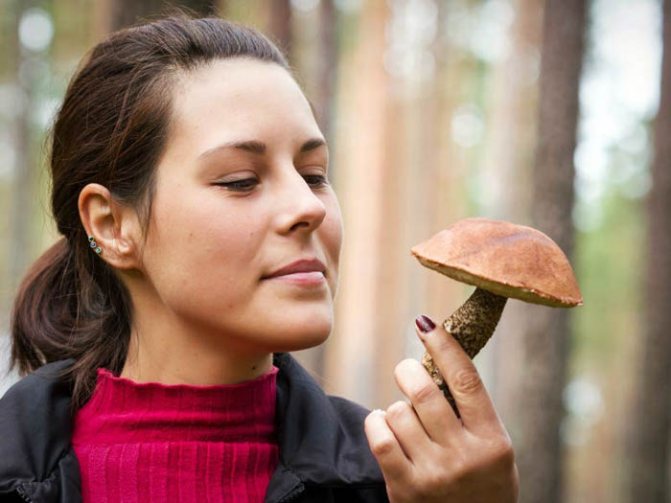
The most useful among forest mushrooms are boletus and porcini mushrooms.
Chanterelles
Chanterelles strengthen muscle tone well, improve vision, and effectively fight insomnia and fatigue. Which is undoubtedly important for mothers who are breastfeeding.
Porcini
It is rich in protein compounds, contains carbohydrates, glycogen, minerals, phosphates, and potassium salts.
At first glance, the porcini mushroom looks like a gall mushroom, which is poisonous. Its difference from white: bitter pulp and a pattern on the stem that resembles a mesh.
Boletus
Boletuses are able to quickly eliminate inflammatory processes, have wound-healing properties, and shorten the recovery period after infectious diseases. This mushroom is very nutritious and gives a good fat when preparing soups.
Do not buy mushrooms at spontaneous markets, “from your hands.” This way you will not be sure of their safety and will jeopardize the health of the whole family.
Why should you be careful with mushrooms?
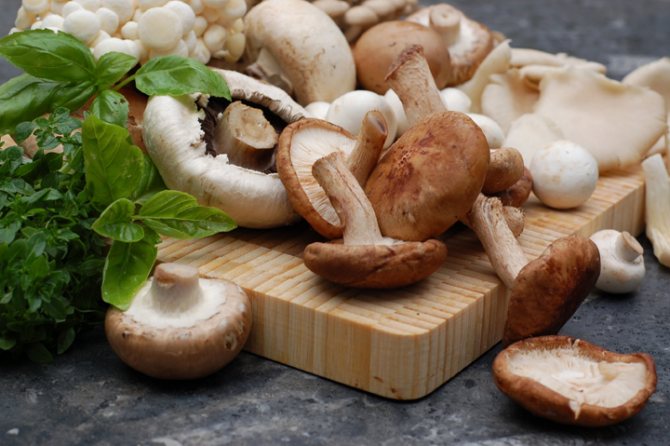
Their peculiarity is that they absorb from the environment and accumulate radioactive compounds, heavy metals and toxins. Mushrooms take a long time to digest (more than 3 hours), are poorly absorbed, and slow down the secretion of digestive juice in the stomach. Contraindicated for disorders of the gastrointestinal tract, kidneys, and gallbladder.
They contain many harmful substances: chitin, choline. The first interferes with the absorption of proteins and cannot be digested by digestive juices. Choline is a poison that can cause diarrhea, shortness of breath, and decreased cardiac activity.
The danger comes from poisonous varieties masquerading as edible. Inexperienced mushroom pickers may make mistakes when collecting, and just one small mushroom is enough for serious consequences.
How can mushrooms be harmful to a nursing mother and baby?
Everything that a nursing woman eats is passed on to the baby through mother's milk. But is it possible to eat mushrooms while breastfeeding a newborn, because they have so many beneficial properties and contain many vitamins and minerals?
Mushrooms during lactation can cause harm to him, expressed by allergic reactions, indigestion, colic, and poisoning. The baby's body does not produce enough enzymes to digest such food. Of course, the mother’s body takes on most of the work, but for a newborn it is still a difficult task.
May contain toxins, radioactive compounds, heavy metals that cause poisoning, developmental arrest and other disorders in the body. The greatest danger is posed by poisonous specimens that are eaten even in minimal quantities, as well as those growing within the city, near roads, factories, and factories. Fungal spores lead to allergic symptoms.
On a note! When choosing a product, nursing women should also pay attention to freshness, absence of damage and worms. Old specimens can be harmful, even if they are allowed for breastfeeding and were grown in special farms.

Benefits and harms for mother and child
Experts in the field of nutrition and pediatrics are still debating and cannot unequivocally answer the question of whether a mother can eat mushrooms while breastfeeding. To answer this question, you need to consider the beneficial and dangerous properties of the product, and also listen to the opinion of doctors.
Beneficial features
Forest gifts, as well as oyster mushrooms and champignons, contain a lot of useful substances necessary for mother and child, but this product is unsafe.
Mushroom composition:
- proteins;
- vitamins C, A, B, D;
- carbohydrates;
- zinc, potassium, phosphorus.
They contain significantly more protein than meat. The vitamin composition strengthens the immune system and the musculoskeletal system.
The composition includes free iodine - an element that contributes to the normal functioning of the thyroid gland. Iodine deficiency leads to a decrease in hormone levels, thereby negatively affecting the lactation process.
Hazardous properties
When eating mushrooms during breastfeeding, you need to choose the right product, because those growing in the forest, if collected incorrectly, can cause harm to health. You cannot collect forest products near highways and old ones, as they have accumulated heavy substances.
- This is a heavy product, during the digestion of which the pancreas and gastrointestinal tract are involved in active work. Enzymes entering the baby’s delicate stomach can cause colic, increased gas formation, and diarrhea.
- The pulp contains a specific protein – fungin. It causes allergies in children, so doctors do not advise children to consume the heavy product until they are 12 years old. Protein can cause rash, colic, and diarrhea.
The famous children's doctor Komarovsky does not recommend eating mushrooms while breastfeeding. After the lactation process is completed, the mother can eat dishes with forest gifts as much as she wishes.
Can you eat mushrooms while breastfeeding?
The period of breastfeeding imposes certain restrictions on the diet of a nursing mother. The age and health status of the child determine whether mushrooms can be consumed while breastfeeding. It is also of great importance how familiar they are on a woman’s menu. If before and during pregnancy the mother often ate mushrooms, then you can eat them while breastfeeding.
A newborn is distinguished by the sensitivity of the digestive tract to food innovations. His body is not yet adapted to digest difficult-to-digest food. For this reason, when asked whether it is possible to have mushrooms while breastfeeding in the first month, pediatricians answer negatively. First, the diet is expanded to include low-allergenic foods that do not cause digestive upset. More complex ones are introduced only after them and provided that the baby is in good health.
What mushrooms can you eat?
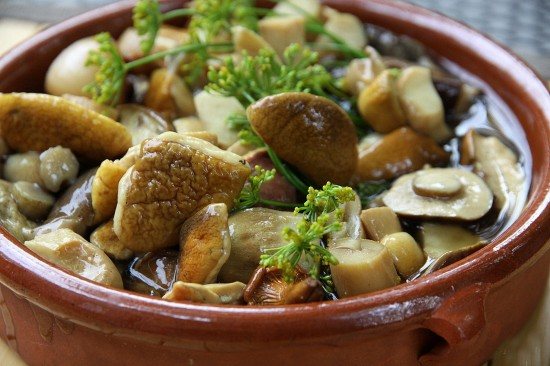
For preparing dishes with natural feeding, mushrooms are used fresh or dried. The preferred method of heat treatment is boiling, stewing, baking. During frying, they are soaked in a large amount of fat, which contains harmful substances due to high temperatures.
Mushrooms that are allowed to be consumed by nursing women include champignons and oyster mushrooms grown in special farms. It is acceptable to use chanterelles and porcini mushrooms in the menu due to their high content of nutrients. But the latter can be eaten only after the child is one year old, because... it accumulates harmful substances more than others; it is difficult to distinguish it from the poisonous bitterling, bilious and satanic varieties.
What mushrooms are not allowed?
During lactation, the mother should remove half-raw, salted, pickled, canned, and fried foods from her menu. It is not advisable to consume salt and spices in large quantities during breastfeeding. Harmful substances can accumulate in canned food and botulism can develop, which can lead to disastrous consequences.
Fried ones lose their dietary properties due to soaking in oil. The temperature of processing in this way is higher, more useful substances are destroyed.
Attention! It is advisable to exclude non-farmed mushrooms from the diet as much as possible. Mushrooms collected in the forest pose a danger to the baby’s well-being.
Champignons during breastfeeding
Unlike other species, champignons do not absorb harmful substances from the soil, are easier to digest and assimilate (up to 80-90%), and are grown on farms. They contain fiber, which removes toxins, poisons and heavy metals. They have a beneficial effect on the nervous and cardiovascular systems, help with constipation, and restore the body after physical exertion, surgery, childbirth, and illness.
Eating champignons while breastfeeding reduces the mother’s stress level, helps cope with headaches, and gives strength. It is acceptable to use for diabetes. Calorie content is 27 kcal per 100 g, which will help restore shape after pregnancy. For a child, this is the safest option, rarely causing unwanted reactions when used wisely.
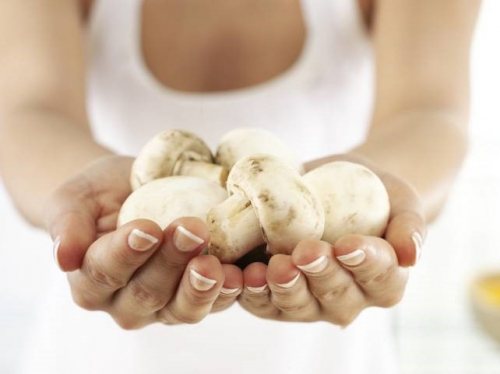
Champignons are a harmless type of mushroom
Is it possible to have pickled mushrooms?
Such products are very undesirable for nutrition during this period. When breastfeeding, pickled mushrooms will do more harm than good. Digested, absorbed worse, contain vinegar and spices. They can change the taste of milk, which will lead to a decrease in lactation. There are frequent cases of poisoning with this dish.
Why are mushrooms harmful for nursing mothers and babies?
Mushrooms are dangerous for a nursing mother and baby, first of all, because they are highly toxic. The fruits absorb hazardous substances, toxins and heavy metals from the soil, which then enter the body of a woman and infant from a mushroom dish. This leads to severe intoxication. In addition, the spores of many fungi enter the lungs and cause allergies.
Mushrooms contain fiber, a large amount of carbohydrates, chitin and fungin. Because of this composition, it is a very heavy product that takes a long time to digest and assimilate. This negatively affects the baby’s still fragile digestion, especially in the first three to four months of life. As a result, the child may have abnormal stools, increased colic and flatulence.
Do not forget that mushrooms are the most common cause of poisoning. Poisoning can be caused due to improper preparation, the use of poisonous and dangerous species, old and wormy products. In addition, mushrooms put a heavy burden on the kidneys, liver and gallbladder.
But if a woman really wants mushrooms during lactation, then sometimes she is allowed to eat the product in small quantities. However, it is important to follow the rules of selection and preparation. Next, we will find out how, when and what mushrooms you can eat during guards.
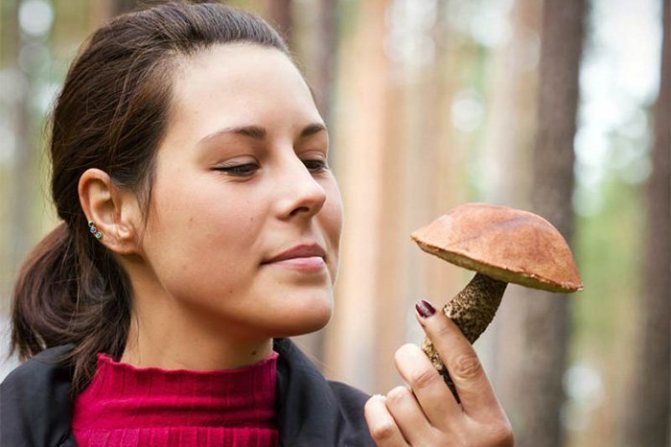
Rules for use by a nursing mother
Following several rules for using mushrooms during breastfeeding will allow you to get the maximum benefit and protect yourself from possible undesirable consequences:
- Buy from stores that comply with storage conditions.
- Give preference only to those specially grown on farms, avoid eating wild mushrooms.
- There are boiled, baked, stewed dishes. Avoid fried, canned and pickled foods.
- Prolonged cooking, although it destroys vitamins, eliminates harmful substances.
- Fine cuts.
- The maximum portion of boiled dish is 200 g, dried for further heat treatment - 40 g.
- Gradual introduction of a new product into the diet.
- At first, you can cook mushroom dishes no more than 2 times a month, then once a week.
- Close monitoring of the child’s condition, exclusion from the diet if a negative reaction is suspected.
When can you start eating mushrooms?
For the first month, a woman must follow a strict diet. Then her diet is gradually expanded to include familiar, non-allergenic foods. When breastfeeding, it is advisable to introduce mushrooms into your menu no earlier than 6 months. It is advisable that by this time the baby has already begun to eat something other than mother’s milk.
On a note! A diluted tincture of kombucha (kombucha) can be given to infants after 6 months. Mom can try using it for 1-2 months. earlier.
How to include mushrooms in the diet without harming the child?

If an allergic reaction occurs, you should exclude the innovation from the menu.
Innovation is added to the diet during natural feeding, like all others, when keeping a food diary in the first half of the day. You can try a small piece first. Any changes in the baby's condition should be recorded. If allergic reactions or gastrointestinal disorders occur in an infant, the innovation should be removed from the menu.
Mushrooms should be consumed strictly according to the rules, increasing the serving size and frequency of inclusion in the menu gradually. Use only specially grown champignons and oyster mushrooms. It is advisable to try varieties collected in the forests no earlier than a year after the birth of the baby.
Cooking rules
Obtaining maximum benefits is ensured by proper preparation of mushroom dishes:
- Before heat treatment, carefully sort through and remove all specimens that raise doubts.
- Use only one type of mushroom for each dish.
- First bring the cooking water to a boil, add salt (0.5 tbsp per 1 liter of water).
- Ready mushrooms settle to the bottom, while raw mushrooms float to the surface.
- Do not use aluminum, cast iron, copper, zinc, or tin utensils for preparing and storing food.
- When breastfeeding, storing prepared meals is prohibited.
- It is not advisable to add strong-smelling spices to champignons, as they easily change the taste.
- Vinegar can be replaced with lemon juice.
- When cooking, the onion will help you identify the poisonous mushroom: if it turns blue, then the contents of the pan cannot be used for food.
- Pre-rinse the dried ones and soak in water for 2-4 hours.
What mushrooms can you
Champignons during breastfeeding are the safest type of mushroom, since they practically do not absorb toxins, but, on the contrary, cleanse the body and remove toxins and heavy metals. They contain a large amount of liquid, which is important for a nursing mother and the establishment of lactation, as well as for ensuring normal metabolism. Champignons are easier to digest than other mushrooms. Helps eliminate constipation and improve bowel movements.
During a diet, champignons can easily replace meat. They contain protein and provide the necessary energy, while being low in calories. 100 grams of product contains only 27 kcal. Champignons do not contain sugar or dangerous fats, so they do not lead to poisoning or weight gain. In addition, the product is safe for people with diabetes.
Oyster mushrooms are the second safest type of mushroom. They are similar in composition to meat, but are lower in calories, so this product is also often included in the diet menu. Oyster mushrooms have a positive effect on blood composition, remove cholesterol and harmful radioactive elements from the body, and prevent the occurrence of various infections. They do not contain toxins, but are more allergenic.
Champignons and oyster mushrooms are grown in special conditions, far from industrial zones. Therefore, they do not contain toxins or other dangerous substances. You can be sure of the safety of such a product, which cannot be said about wild mushrooms. The safest of these species are chanterelles and porcini mushrooms.
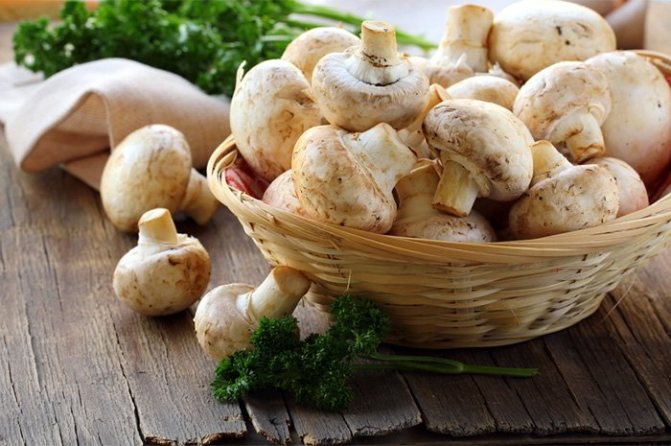
Porcini mushrooms should be eaten with caution and preferably not earlier than a year. Because, firstly, they absorb heavy metals well. And, secondly, they are difficult and take a long time to digest. But the biggest danger is that poisonous species and varieties that resemble porcini mushrooms grow in the forests.
Remember that the original never darkens when cut! Real porcini mushrooms stimulate digestion and have a positive effect on the body, strengthen the immune system, give energy and strength. They are recommended to be added to soup or used when preparing broth, but it is better not to use them as a second course.
Chanterelles are considered very useful. They help cope with depression and insomnia, improve vision and improve sleep, and strengthen muscle tone. In addition, it is an excellent prevention of tuberculosis and colds. When using chanterelles and porcini mushrooms, pay special attention to the place where the fruit grows!
Is it possible to drink kombucha during breastfeeding?
Kombucha infusion contains amino acids, vitamins, and minerals. It has an antimicrobial effect, restores beneficial intestinal flora, improves sleep, relieves nervousness, and increases performance. Kombucha helps normalize weight, hormonal balance, and strengthen the immune system.
It must be borne in mind that the use of infusion has contraindications. Allergic reactions and digestive problems may occur. Kombucha is prohibited if you have gastritis with high acidity or type 1 diabetes.
When breastfeeding, drink the infusion diluted, freshly prepared (up to 4 days). Start with ¼ cup, gradually increasing the volume to ½ tbsp. Take 40 minutes before meals or 2 hours later.
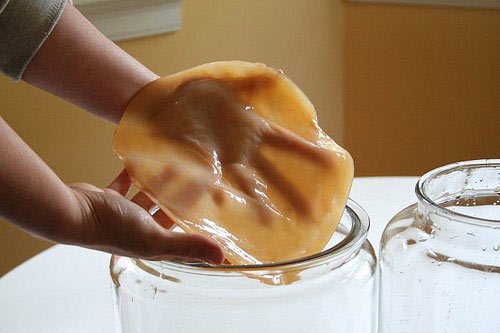
Mushroom recipes
When breastfeeding, it is advisable to prepare mushroom dishes that do not require long frying in oil. Can be used fresh or dried for cooking. Add spices and salt in small quantities. Mushrooms go well with vegetables, herbs, legumes, and sour cream.
Mushroom soup
- champignons – 300-350 g
- potatoes – 450 g
- onion – 90 g
- pasta – 100 g
- vegetable oil – 30 g
- greens, bay leaf, salt
- water – 2.5 l
Sauté the onion until golden brown, add champignon slices and fry a little more. Add salt, bay leaves, diced potatoes to boiling water, cook for 20 minutes. Add champignons with onions, pasta, cook for 15-20 minutes. At the end add finely chopped herbs.
Stewed cabbage with champignons in a slow cooker
- cabbage – 1000 g
- champignons – 300 g
- carrots – 140 g
- onion – 140 g
- tomato paste – 1 tbsp. l.
- vegetable oil – 30 g
- granulated sugar – 1 tsp.
- salt, pepper, bay leaf
- water – 4 tbsp. l.
Peel the vegetables and rinse. Cut the champignons into slices, the onion into half rings, finely chop the cabbage, grate the carrots. Pour oil into the multicooker, set to frying mode, add champignons, fry for about 10 minutes. Add onion, carrots, simmer, stirring, 10 minutes. Dilute tomato paste with hot water, add along with cabbage, salt, and spices to the champignons. Mix everything well, set the simmer mode for 30 minutes.
Rice with champignons
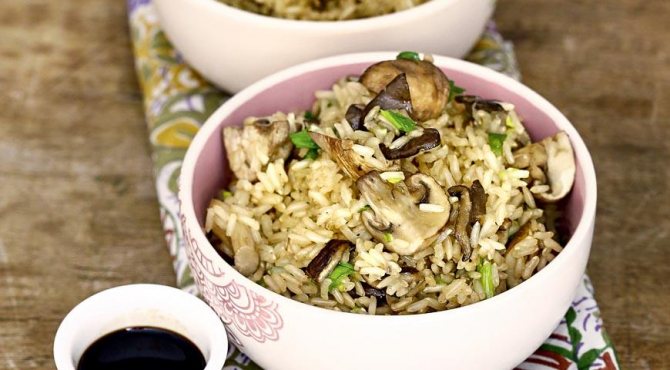
- rice – 2 tbsp.
- champignons – 300 g
- carrots – 90 g
- onion – 90 g
- vegetable oil – 45 g
- salt, spices
Wash the vegetables, peel and rinse. Grate the carrots, cut the onion into cubes, and cut the champignons into thin slices. Fry vegetables in a frying pan with oil for 4 minutes. Add champignons, simmer, stirring, for 7 minutes. Salt and pepper, add rice, pour boiling water 1 cm above. Cover with a lid and leave on low heat until the rice is cooked.
Breastfeeding is not a reason to give up your favorite foods. Mushrooms are allowed in the diet of nursing women who consumed them before this period without health problems. The beneficial properties will improve the health of mother and baby, provided that the rules for preparing mushroom dishes are followed.
Rules for eating mushrooms
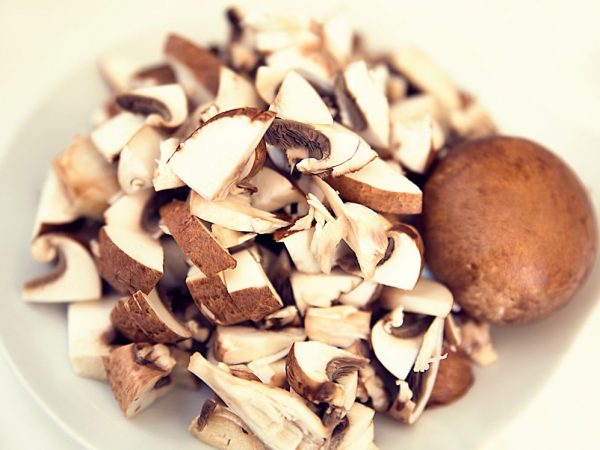
A nursing mother can eat mushrooms in small quantities.
Often a woman during lactation experiences a strong, irresistible desire to eat a mushroom dish. In such cases, it is possible to consume mushrooms in small quantities.
You can start eating mushrooms while breastfeeding only 4-6 months after birth.
For the first time, it is better to try them boiled (no more than 5 pieces). See how the child's body reacts. If allergy symptoms, gastrointestinal problems or other signs appear, immediately show the child to the pediatrician. If there is no negative reaction, then periodic consumption of mushrooms is not contraindicated for a nursing mother.
The daily norm is 50-60 g of the finished product.
What mushrooms can you eat and how often?
For a nursing mother, mushrooms are allowed to be eaten once every 2 weeks in the first year of breastfeeding, and in the second year - once a week.
When breastfeeding, champignons and oyster mushrooms pose virtually no danger. Compared to other species, champignons (white, brown, dark) almost do not absorb toxic substances from the soil and have many beneficial properties:
- free the body from harmful substances;
- contribute to the normalization of lactation and metabolism in the female body due to the high fluid content in its composition;
- prevent constipation and normalize stool;
- easy to digest due to the absence of heavy elements;
- are low-calorie;
- charge the body with energy;
- are meat substitutes due to their high protein content;
- do not cause intoxication, poisoning and obesity;
- approved for consumption by patients with diabetes due to the absence of sugars in their composition.
When breastfeeding, oyster mushrooms will also be useful because they contain a low amount of calories and can easily replace meat products. They improve blood quality, rid the body of cholesterol and other harmful substances, and prevent the occurrence of infectious diseases. Like champignons, oyster mushrooms are not toxic, but are more likely to cause allergic reactions.
You should not eat mushrooms if you have problems with the stomach and intestines, with kidney failure, with diseases of the digestive system and liver, as well as with frequent accumulation of gases in the intestines (flatulence).
What mushrooms should you eat carefully?
In the first six months of breastfeeding, doctors do not recommend eating chanterelles, porcini mushrooms of any kind, milk mushrooms and boletus. These forest mushrooms absorb heavy metals, so they take a long time to digest.
When the breastfeeding period is over, feel free to eat all the mushrooms. Porcini mushroom improves the functioning of the digestive and immune systems, promotes restoration of strength and gives the body energy. Chanterelles also have a number of positive qualities: they help normalize sleep, increase visual acuity, and strengthen muscles. They are used to prevent colds.
